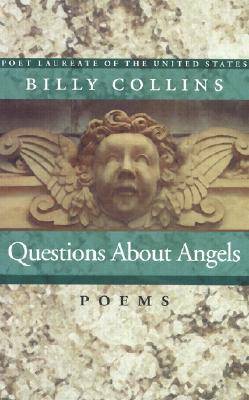

Questions About Angels
by Billy Collins
Billy Collins can pack the house. Funny and laid-back, his clear, often brief poems are easy to understand and enjoy -- which is why his readings are sometimes standing-room-only affairs. Collins may be a college professor and NEA-grant recipient, but he's not above using a disinfectant ad as an epigraph. "Public restrooms give me the willies," reads the epigraph to a poem appropriately titled "The Willies." That man-on-the-street brand of humor, utterly stripped of academic pretense, is trademark Collins. QUESTIONS ABOUT ANGELS, a reissue of Collins's fourth volume of poems, offers 70 pages of well-formed, very American verse that -- not surprisingly -- doesn't require a shelf of dictionaries. In fact, just as he laughs at epigraphs, Collins gleefully pokes fun at the very concept of dictionaries. Here, for example, are the opening lines to "The Hunt," which initially offer the flowing, dreamy verse many expect from a poet: Somewhere in the rolling hills and farm country that lie beyond speech Noah Webster and his assistants are moving across the landscape tracking down a new word.Then Collins really gets going, letting his claws dig in. In the next stanza, that trademark humor really shows: It is a small noun about the size of a mouse, one that will seldom be used by anyone, like a synonym for isthmus but they are pursuing the creature zealouslyCollins could be talking about poetry itself, a form "zealously pursued" but too often "seldom used." Despite the deadpan tone, these are poems that are aware of poetic tradition. QUESTIONS ABOUT ANGELS opens with a poem called "American Sonnet," which announces that "We do not speak like Petrarch or wear a hat like Spenser." Collins seems to believe that his particular American landscape and culture requires a variation on the standard forms of Western tradition. This country, he seems to say, demands a rethinking of it all.Part of that rethinking is a probe of the whole idea of a "poet." Collins asks the questions his students would love to ask, if they only had the guts. How, he asks, do you know for sure if a poet is contemporary? This, of course, is a twist on the earlier, unspoken-but-understood question of "What makes a sonnet a sonnet, anyway?" addressed in the first poem.Just as he produced an American "sonnet" that rolls off the tongue with the ease of banter, Collins comes up with an American, can-do answer to the "who's a contemporary poet?" question: It is easy to find out if a poet is a contemporary poet and thus avoid the imbroglio of calling him Victorian or worse, Elizabethan, or worse, medieval. If you look him up in The Norton Anthology of English Literature and the year of his birth is followed only by a dash and a small space for the numerals only spirits know, then it is safe to say that he is probably aliveThough clothed in simple words and humor, Collins is actually taking a pretty sophisticated jab in these two stanzas, which are the first part of the appropriately titled poem "The Norton Anthology of English Literature." Is a poet worthy simply because he is in the anthology? And do these omnipresent anthologies really define periods and countries? Coming just a few pages after the Noah Webster reference, Collins may also be pushing his readers to wonder about the anthologizers' research processes.Collins loves to mix poems to history's overachievers with odes to underachievers or family pets who never seemed to have much, if any, ambition. In one of the book's sweeter poems, Collins offers praise of a character named Riley. Here's the last stanza of the very brief poem "The Life of Riley: A Definitive Biography," where yet again, Collins mixes the quotidian and the poetic, letting his linguistic ability peep through the everyman persona at key moments: He never had a job, a family or a sore throat. He never mowed a lawn. Passersby would always stop to remind him whose life it was he was living. He died in a hammock weighing a cloud.In a book that mentions weighing a dog and stripping layers of clothing off as he writes, it makes sense that this poet doesn't flinch from depicting the weighing of a cloud. Like the character who never had a sore throat, Collins writes glitch-free poems that are both a breeze and a blast to read. --Aviya Kushner
Release Date:
April 5, 2003

